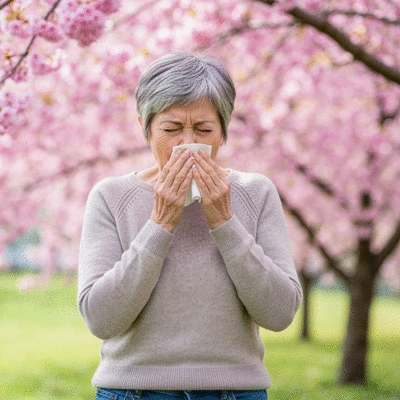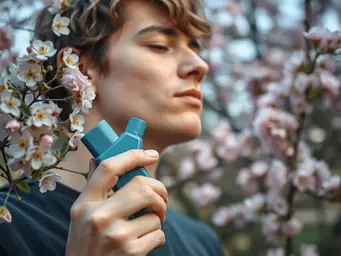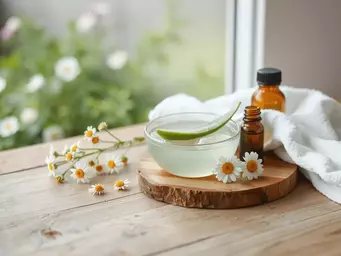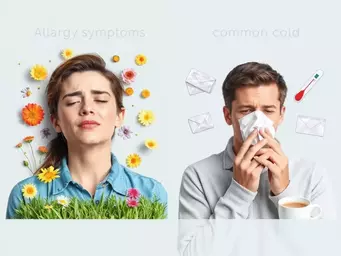Natural Strategies for Seasonal Allergies

Have you ever felt the uncomfortable itch that comes with the changing seasons? For many, this marks the onset of seasonal allergies, a reminder that as nature flourishes, so do our sensitivities. Understanding how these allergies work can empower you to reclaim your enjoyment of the outdoors.
What You Will Learn
- Identify Your Triggers: Keeping a symptom diary can help you track what causes your allergy symptoms.
- Differentiate Allergies from Colds: Recognizing the key differences can assist in choosing the right relief methods.
- Explore Natural Remedies: Options like saline nasal irrigation or local honey may provide relief.
- Consult with Experts: Regular check-ins with an allergist can help tailor your management plan effectively.
- Optimize Your Environment: Employing HEPA filters and reducing indoor allergens can significantly improve your comfort.
Allergies vs. Common Colds: Key Differentiators
Understanding the distinctions between seasonal allergies and the common cold can help in identifying the right treatment approach. Below is a comparison of their key characteristics.
Seasonal Allergies
- ✓ Duration: As long as exposed to allergen
- ✓ Symptoms: Often itchy eyes/skin, sneezing, runny nose
- ✓ Onset: Appear quickly after exposure
Common Colds
- ✕ Duration: Typically last 7-10 days
- ✕ Symptoms: Usually body aches, fever, sore throat
- ✕ Onset: Develop gradually
The Impact of Seasonal Allergies on Daily Life
Seasonal allergies can significantly impact our daily lives, turning what should be a beautiful time of year into a struggle against sneezing, itching, and discomfort. Have you ever felt that nagging itch in your throat as the trees start to bloom? You’re not alone! Millions of people experience these symptoms as pollen floods the air, signaling the arrival of spring. Understanding how seasonal allergies work can help us manage them better and reclaim our enjoyment of the outdoors.
At What Are Allergies, we aim to break down the science behind these allergies, exploring the causes and symptoms that affect so many. Seasonal allergies, particularly, occur when our immune systems mistakenly react to pollen from trees, grasses, and weeds. When these particles enter our bodies, they trigger an immune response, leading to the release of histamines that cause the familiar sneezing, runny nose, and itchy eyes.

Understanding Seasonal Allergies: Causes and Symptoms
Identifying seasonal allergies requires understanding their common causes and symptoms. Here’s what you need to know:
- Pollen Exposure: The primary culprit is pollen released from trees, grasses, and weeds during different seasons, typically in spring and early fall.
- Common Symptoms: These can include sneezing, nasal congestion, itchy eyes, and even fatigue.
- Timing: Symptoms often coincide with specific seasons, peaking during high pollen counts.
By recognizing these factors, you can better prepare for the allergy season ahead. Keeping a symptom diary can be a simple yet effective way to pinpoint your triggers, allowing you to manage your environment and expectations.
Recognizing Differentiators: Allergies vs. Common Colds
It’s easy to confuse seasonal allergies with the common cold, but there are key differences. Understanding these can help you find the right relief!
- Duration: Allergies can last as long as you’re exposed to the allergen, whereas colds typically last 7-10 days.
- Symptoms: Allergies often cause itchy eyes or skin, while colds usually come with body aches and fever.
- Onset: Allergy symptoms appear quickly after exposure to allergens, unlike colds that develop gradually.
By recognizing these differentiators, you’ll be better equipped to decide on the right treatment methods. If you find yourself dealing with persistent symptoms, it might be time to consult with a professional, like myself. Remember, understanding your body is the first step toward effective management!
Interactive Poll: Share Your Thoughts!
How do you typically manage your seasonal allergies? Select one of the options below:
Frequently Asked Questions About Seasonal Allergies
What are seasonal allergies?
Seasonal allergies occur when your immune system reacts to pollen from trees, grasses, and weeds, typically released during spring and early fall. This immune response triggers symptoms like sneezing, runny nose, and itchy eyes.
How can I tell the difference between seasonal allergies and a common cold?
Seasonal allergies usually last as long as you're exposed to the allergen and often cause itchy eyes or skin. Colds typically last 7-10 days and are often accompanied by body aches and fever. Allergy symptoms appear quickly after exposure, while cold symptoms develop gradually.
What are some natural remedies for seasonal allergies?
Natural remedies can include saline nasal irrigation to clear nasal passages or consuming local honey, though scientific evidence for honey's effectiveness is mixed. Dietary adjustments, such as incorporating anti-inflammatory foods, can also be beneficial.
When should I see a doctor for my allergy symptoms?
It's advisable to seek professional guidance if your symptoms are severe, persistent, or worsening despite home remedies or over-the-counter treatments. You should also consult a doctor if you're unsure about your triggers or experience symptoms like severe difficulty breathing or chest tightness.
How can I optimize my home environment to reduce allergy symptoms?
Using HEPA filters in your home can help remove airborne allergens. Regularly cleaning and reducing indoor allergens, such as dust mites and pet dander, can also significantly improve your comfort during allergy season.
Recap and Key Takeaways for Managing Seasonal Allergies
Managing seasonal allergies can feel overwhelming, but with a clear understanding and personalized approach, you can take control. It's essential to recognize that everyone’s experience with allergies is unique; what works for one person may not work for another. This is where the importance of personalization in allergy management comes into play. By understanding your specific triggers and symptoms, you empower yourself to choose the best strategies for relief.
Some key takeaways to remember include:
- Identify Your Triggers: Keep a journal to track what causes your symptoms.
- Explore Natural Remedies: Consider options like saline nasal irrigation or local honey. You can also explore various natural ways to combat seasonal pollen allergies.
- Adjust Your Diet: Incorporate anti-inflammatory foods and essential vitamins.
- Optimize Your Environment: Use HEPA filters and reduce indoor allergens.
These steps can significantly improve your quality of life during allergy season. Remember, taking the time to personalize your approach can make all the difference!

The Importance of Personalization in Allergy Management
As someone who has dedicated over a decade to understanding allergies, I’ve seen firsthand how personalized management strategies lead to better outcomes. It’s not just about following general advice; it’s about tailoring your approach based on individual needs. For instance, if you discover that pollen is your primary trigger, you may choose to stay indoors during peak pollen times or invest in quality air purifiers for your home.
Consider these personalized strategies:
- Keep Track of Symptoms: A symptom diary can help identify patterns linked to specific triggers.
- Consult with Experts: Regular check-ins with an allergist can ensure your management plan is effective.
- Stay Informed: Follow reliable sources for updated information on allergens in your area.
Ultimately, the more you know about your body and its responses, the better you can navigate the challenges of seasonal allergies.
When to Seek Professional Guidance for Allergy Symptoms
While many allergy management techniques can be done at home, there are times when seeking professional help is necessary. If you find that your symptoms are persistent or worsening despite implementing changes, it might be time to consult with an allergist. This is particularly important if you experience symptoms such as severe difficulty breathing, chest tightness, or swelling. Research on allergic rhinitis highlights the importance of timely and effective management, which often includes professional advice for optimal outcomes, as detailed in this review on allergic rhinitis management.
Here are some signs that it’s time to seek professional guidance:
- Severe Symptoms: If your reactions are intense or life-threatening.
- No Improvement: When home remedies or over-the-counter treatments aren't providing relief.
- Uncertainty About Triggers: If you can’t pinpoint what’s causing your issues.
Remember, your health is a priority! Don’t hesitate to reach out for assistance when needed.
Encouragement for a Natural Approach to Allergy Relief
As we explore various avenues for managing allergies, I believe in the power of a natural approach. Many of my patients have shared their positive experiences with natural remedies, highlighting the importance of addressing their allergies holistically. Connecting with community experiences can often provide the support and encouragement needed to embark on your own journey.
Connecting with Community Experiences: Testimonials and Case Studies
At What Are Allergies, we value the stories of individuals who have successfully managed their allergies. Hearing from others can not only inspire you but also provide practical insights that you might not have considered. For example, one family found that switching to a diet rich in anti-inflammatory foods helped reduce their child's allergy symptoms significantly. Another user discovered relief through a combination of local honey and regular saline nasal irrigation.
It’s important to remember that each journey is unique, but sharing experiences can foster a sense of community and support. If you have a story, I invite you to share it with us!
Next Steps: Practical Tips to Start Your Allergy Management Journey
Ready to take control of your allergy management? Here are some practical tips to get you started:
- Assess Your Environment: Identify allergens in your home and take steps to reduce exposure.
- Keep a Symptom Journal: Document your experiences and responses to different remedies.
- Educate Yourself: Read up on allergies, treatments, and natural remedies.
Taking small, actionable steps can lead to significant improvements in your allergy management. Remember, you’re not alone in this journey; I’m here to help guide you every step of the way!
Recap of Key Points
Here is a quick recap of the important points discussed in the article:
- Identify Your Triggers: Keep a journal to track what causes your symptoms.
- Explore Natural Remedies: Consider options like saline nasal irrigation or local honey.
- Adjust Your Diet: Incorporate anti-inflammatory foods and essential vitamins.
- Optimize Your Environment: Use HEPA filters and reduce indoor allergens.
- Consult with Experts: Regular check-ins with an allergist can ensure your management plan is effective.
- Stay Informed: Follow reliable sources for updated information on allergens in your area.










































